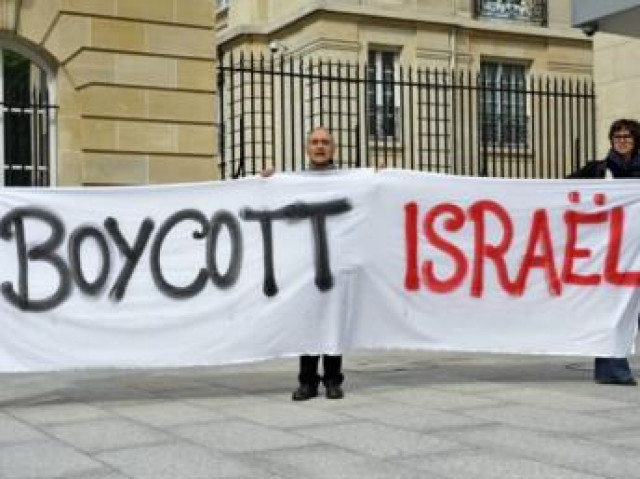Boycott of Israeli settler products gains ground
As BDS movement spreads, Israeli brands will look toxic to consumers, depriving Israel of world markets: Barghouti.

Last week, the Norwegian government said Norway's state pension fund GPFG, one of the world's largest sovereign wealth funds, excluded an Israeli construction company involved in building settlements "in breach of international humanitarian law in east Jerusalem" after a recommendation from GPFG's council of ethics.
In a recent column published by European newspapers, the former speaker of Israel's parliament, Avraham Burg, lauded the European Union's intention stated in May "to ensure that settlement products ... are no longer labelled as 'made in Israel'".
"Member states also committed to ensure that settlement products were excluded from preferential treatment under the EU-Israel Association Agreement"," he added.
"Preventing the mislabelling of settlement products as 'made in Israel' and blocking their preferential entry into the EU seems a symbolic and minor step," reckoned Burg, who nonetheless saw in it "a ray of light."
Human Rights Watch (HRW) pointed out that "EU laws prohibit preferential treatment for goods produced in violation of international law in this way, but Europe allows Israel to bundle goods from illegal settlements with goods from inside Israel, and to ship the whole lot to European markets tariff-free."
"Rather than clearly stating the actual origins of all its exports, Israel merely provides the originating postal codes. The job of spotting settlement goods is left to importers, yet some settlement goods bear the misleading codes of corporate headquarters inside Israel," wrote Bill Van Esveld, senior Middle East researcher at HRW.
At the end of April, Britain's fifth-largest food retailer, the Co-Operative Group, announced it was extending a boycott of goods from settlements to any supplier known to source from these areas, ending "business with four companies, accounting for £350,000 ($560,000/ 430,000 Euros) worth of sales."
In May, South Africa and Denmark announced initiatives to identify products made in Israeli settlements in the Palestinian territories.
That same month, Migros -- Switzerland's second-largest retailer -- said that from 2013 it will mark such goods as coming from "West Bank" or "East Jerusalem," adding "Israeli settlement area."
Referring to the South African measures, Omar Barghouti, founding member of the Palestinian Boycott, Divestment and Sanctions (BDS) campaign, said a new law would hold legally accountable "any supermarket in South Africa caught selling Israel's colonies products under the label 'product of Israel.'"
"While South African supermarkets are now under pressure to stop sourcing Israeli colonies' products," he told AFP that "Israel has made it nearly impossible to effectively boycott Israeli colonies' products."
"So instead of boycotting colonies' products, the BDS movement is pushing for boycotting companies that deal with the colonies. This is much more effective and easier to implement," he notes.
"Even if a company has 10 or 20 percent of its raw material coming from the colonies, that's good enough to boycott it because according to international law, that company is complicit," Barghouti stresses.
"We were most effective when we targeted companies rather than products," he said. The BDS played a crucial role in the bankruptcy of the main Israeli agricultural exporter, Agrexco, he said.
He also cited contracts lost by Veolia and Alstom following their involvement in the construction of the controversial Jerusalem light rail.
Dan Catarivas, director of international relations at the Manufacturers Association of Israel, noted that "what's produced in the (Palestinian) Territories and gets exported represents less than one percent of Israeli exports.
"But our concern is the extent to which the call to boycott goods from the territories could be a first step for the boycott of Israeli goods," he added, noting that the general Israeli boycott is a prospect on BDS's agenda.
"In no other situation can you see this duality: those who call for boycotting China over its occupation of Tibet do not call for boycotting Chinese products made in occupied Tibet only," Barghouti argued.
"Those in Britain or the US calling for divestment from Sudan over Darfur do not call for divesting only from Sudanese companies working in Darfur."
"Increasingly, as the BDS movement spreads in the economic, cultural, sports and academics fields, the brand Israel will look toxic to consumers, depriving Israel of world markets," he predicted.



















COMMENTS
Comments are moderated and generally will be posted if they are on-topic and not abusive.
For more information, please see our Comments FAQ